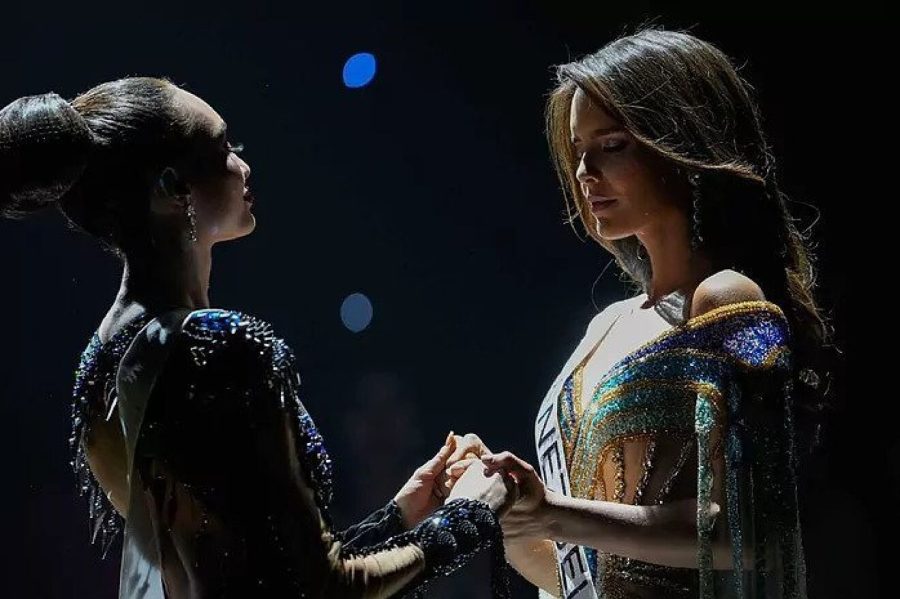Profit before beauty or beauty before morals
The Miss Universe pageant, one of the most well-known and prestigious beauty contests in the world, is also one of the most ridiculous spectacles the entertainment industry has come up with. The Miss Universe contest, due to its worldwide status, creates unreasonable, unattainable expectations for both contestants and all women.
The image of attractiveness according to quite literally, the universe, becomes more unattainable to regular women who admire, and even idolize, those who take the stage. This creates a toxic image of beauty and markets straight off of girl’s and women’s insecurities, prioritizing profit over morality and destroying thousands of women’s self-image along the way.
The organization has been plagued by allegations of corruption in recent years. One of the main accusations is that the pageant’s ownership, the Miss Universe Organization, has been manipulating the results in favor of certain contestants, which makes the contest even more unlikeable and controversial.
One of their more recent scandals came with the 2023 version of this pageant. The internet’s reaction to the crowning of Miss USA was immense, and the outrage was not quiet. I, and the majority of viewers, were expecting Amanda Dudamel, Miss Venezuela, to win the competition, and were disappointed with R’Bonney Gabriel, Miss USA, being crowned. Dudamel was well spoken, intelligent and charismatic, she was the public’s favorite. Her words symbolizing ecouragement and confidence for all viewers.
This controversy surges with Anne Jakkaphong Jakrajutatip, who recently acquired the Miss Universe Organization (MUO). She also owns both Miss USA and Miss Teen USA, leading to suspicions that Gabriel’s win was predetermined. Gabriel’s fellow competitors raised questions about the validity of her victory, due to an advertisement for NIZUC Spas featuring Gabriel less than 24 hours after she won the Miss Universe competition. The new owners connection to Miss USA is highly questionable especially since the first Miss Universe under her ownership led to the crowning of the former.
The organization has pledged to increase transparency and accountability by implementing new policies and processes to improve fairness and impartiality at all phases of the competition. Reshaping the system, from participant selection through to final judgment and crowning. In addition to provide more aid and resources for the candidates’ personal and professional development; there is a focus on diversity, inclusion, and empowerment for all women.
The pageant’s ownership has been accused of manipulating the results in favor of certain contestants and engaging in unethical practices, such as pressuring contestants to undergo unnecessary plastic surgery and signing unfair contracts. Despite these accusations, the MUO maintains that the pageant is run fairly, but their lack of transparency makes it difficult to verify these claims.
I also believe that the pageant’s focus on physical appearance sucks. MUO places an excessive emphasis on beauty, and contestants are judged primarily on their looks. This not only perpetuates incredibly stupid beauty standards, it also undermines the intelligence, talent, and social impact of the contestants. Judging beauty and what constitutes as universal are both subjective and problematic and creates a harmful environment for girls and women. Allowing society to demand perfection and unattainable characteristics like most, if not all, pageants do.
However, some may argue that beauty pageants like Miss Universe provide a platform for women to showcase their beauty, talent, and intelligence on a global stage, and it empowers women by allowing them to gain exposure and pursue opportunities in various fields. Additionally, some argue that the pageant can have a positive impact on local communities by promoting tourism and highlighting cultural diversity.
Regardless, they are still objectifying women, and when beauty is objectified on a stage, it becomes a representation of societal beauty standards. If beauty pageants aim to promote women’s empowerment, they must improve their curation and acknowledge the impact of representation. It is widely understood that beauty pageants are harmful due to their promotion of unrealistic beauty standards, and even if we think otherwise, most of these societal demands are as current as one hundred years ago.
It is imperative for beauty pageant organizers to acknowledge these criticisms and make positive changes. Beauty pageants must include more diverse and empowering rounds, ask thought-provoking questions, and provide a space for all genders to be represented. Even as a corporate social responsibility initiative, it is hopeful that in the future, beauty pageants will prioritize inclusivity over appropriation.
Clearly, it’s long overdue for MUO to take a hard look at its practices and to make meaningful changes. Greater transparency and accountability are needed to ensure that the pageant is run fairly, and the organization should shift its focus away from physical appearance to more meaningful attributes such as intelligence, talent, and social impact. Until these changes are made, the Miss Universe pageant will remain nothing more than a corrupt and superficial spectacle.




